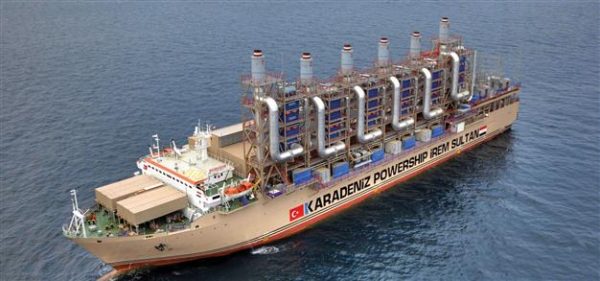
Lebanon lost as much as a quarter of its mains electricity supply Friday when a Turkish firm halted power generation, the latest blow to the crisis-hit country already suffering long blackouts.
Lebanon’s ailing electricity sector is facing dire cash shortages, as the country grapples with its worst economic crisis since the 1975-1990 civil war.
The caretaker energy minister has for months warned the country was heading to “total darkness” if no emergency funds were secured to keep the lights on.
Karpowership said it had been left with little choice but to cease production from its two power barges moored off Lebanon’s coast after months of delayed payment and in the face of a prosecutor’s threat to seize the vessels.
“We deeply regret shutting down” the barges in the coastal areas of Zouk and Jiyeh, the Turkish company said in a statement.
“For 18 months, we have been exceedingly flexible with the state, continually supplying power without payment or a payment plan, because the country was already facing very hard times,” it said.
But “no company can operate in an environment with such direct and undue risks”.
A Karpowership source said the remaining fuel in the barges’ power plants ran out at 0500 GMT and transmission to the Lebanese grid ceased.
The source said the company was owed more than $100 million by the Lebanese state but was equally concerned about the prosecutor’s order.
– Legal case –
In early May, a Lebanese prosecutor banned the barges from leaving the country over the alleged payment of illicit commissions, accusations that could lead to a $25 million penalty, a Lebanese judicial source said at the time.
Karpowership has rejected the allegations as “baseless and lacking credibility”.
The Turkish firm says the two barges, which have been operating in Lebanon since 2013, have accounted for up to 25 percent of the mains power supply.
State-run utility Electricity of Lebanon (EDL) said the grid lost 240 megawatts after the power barges stopped production.
Lebanon has poured billions of dollars in subsidies into the electricity sector, but routine power cuts have persisted for decades, forcing those Lebanese who can afford it to use private generators for up to 12 hours a day.
In the capital Beirut in recent months, the streets have grown increasingly dark at night as street lamps lose power.
Energy analyst Marc Ayoub said the barges going out would mean “more hours of cut-offs from EDL since they are supplying around 3-4 hours from EDL supply”.
This will mean “more reliance on diesel generators”.
But, he said, the barges would have likely stopped working anyway by the end of the month because Lebanon is struggling to pay for fuel imports to keep its power plants running.
“If the ministry, and consequently EDL, don’t have money for fuel procurement, they will be shutting off all the power plants,” said the researcher at the American University of Beirut.
– Timeline to darkness –
Lebanon’s caretaker energy minister Raymond Ghajar has for months been sounding the alarm.
Parliament approved $200 million in emergency funding in late March to stave off a national power cut, but the constitutional committee earlier this month suspended its implementation.
Ghajar has warned that, without the crucial advance, remaining power stations would all be forced to stop working by June 22.
According to his timeline, another power plant in Zouk could run out of fuel as early as next Tuesday.
EDL has been running on a loan allocated under the 2020 budget, but the 2021 budget has not yet been passed, with the country also mired in political crisis.
Lebanon desperately needs a new government to unlock billions of dollars in aid, but bickering politicians have for nine months failed to agree on a line-up.
The government resigned after a huge explosion of ammonium nitrate fertiliser at Beirut’s port in August 2020 killed more than 200 people and ravaged half of the capital.
AFP/FRANCE24

Leave a Reply
You must be logged in to post a comment.